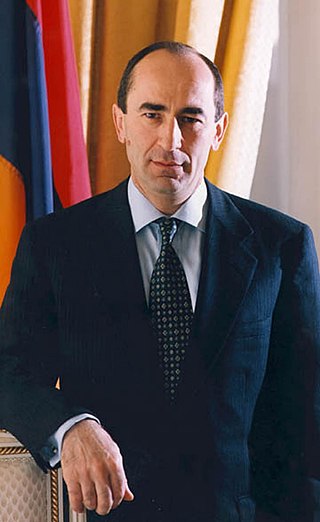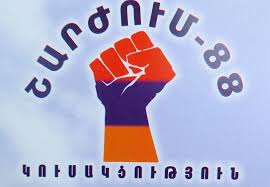| |||||
| Decades: | |||||
|---|---|---|---|---|---|
| See also: | |||||
The following lists events that happened during 2010 in the Nagorno-Karabakh Republic .
| |||||
| Decades: | |||||
|---|---|---|---|---|---|
| See also: | |||||
The following lists events that happened during 2010 in the Nagorno-Karabakh Republic .

Nagorno-Karabakh, also referred to as Artsakh by Armenians, is a landlocked region in the South Caucasus, within the mountainous range of Karabakh, lying between Lower Karabakh and Syunik, and covering the southeastern range of the Lesser Caucasus mountains. The region is mostly mountainous and forested.

Robert Sedraki Kocharyan is an Armenian politician. He served as the President of the Nagorno-Karabakh Republic from 1994 to 1997 and Prime Minister of Nagorno-Karabakh from 1992 to 1994. He served as the second President of Armenia between 1998 and 2008 and as Prime Minister of Armenia from 1997 to 1998.

Levon Hakobi Ter-Petrosyan, also known by his initials LTP, is an Armenian politician who served as the first president of Armenia from 1991 until his resignation in 1998.

Artsakh, officially the Republic of Artsakh or the Nagorno-Karabakh Republic, is a doubly landlocked breakaway state in the South Caucasus whose territory is internationally recognised as part of Azerbaijan. Artsakh controls a part of the former Nagorno-Karabakh Autonomous Oblast, including the capital of Stepanakert. It is an enclave within Azerbaijan. Its only overland access route to Armenia is via the 5 km (3.1 mi) wide Lachin corridor which is under the control of Russian peacekeepers.

Movement 88 is a political party in Artsakh.

The Communist Party of Artsakh is a communist political party in the Republic of Artsakh.

The First Nagorno-Karabakh War was an ethnic and territorial conflict that took place from February 1988 to May 1994, in the enclave of Nagorno-Karabakh in southwestern Azerbaijan, between the majority ethnic Armenians of Nagorno-Karabakh backed by Armenia, and the Republic of Azerbaijan. As the war progressed, Armenia and Azerbaijan, both former Soviet Republics, entangled themselves in protracted, undeclared mountain warfare in the mountainous heights of Karabakh as Azerbaijan attempted to curb the secessionist movement in Nagorno-Karabakh. The enclave's parliament had voted in favor of uniting with Armenia and a referendum, boycotted by the Azerbaijani population of Nagorno-Karabakh, was held, in which a majority voted in favor of independence. The demand to unify with Armenia began in a relatively peaceful manner in 1988; in the following months, as the Soviet Union disintegrated, it gradually grew into an increasingly violent conflict between Armenians and Azerbaijanis, resulting in ethnic cleansing, including the Sumgait (1988) and Baku (1990) pogroms directed against Armenians, and the Gugark pogrom (1988) and Khojaly Massacre (1992) directed against Azerbaijanis. Inter-ethnic clashes between the two broke out shortly after the parliament of the Nagorno-Karabakh Autonomous Oblast (NKAO) in Azerbaijan voted to unite the region with Armenia on 20 February 1988. The declaration of secession from Azerbaijan was the culmination of a territorial conflict. As Azerbaijan declared its independence from the Soviet Union and removed the powers held by the enclave's government, the Armenian majority voted to secede from Azerbaijan and in the process proclaimed the unrecognized Republic of Nagorno-Karabakh.

Samvel Andraniki Babayan is an Armenian military commander and politician from Nagorno-Karabakh. He was one of the founders and main commanders of the Artsakh Defence Army during the First Nagorno-Karabakh War and became a hero among Armenians for the military victories achieved under his command.

The Republic of Artsakh is a republic with limited recognition in the South Caucasus region. The Republic of Artsakh controls most of the territory of the former Nagorno-Karabakh Autonomous Oblast. It is recognized only by three other non-UN member states, Abkhazia, South Ossetia and Transnistria. The rest of the international community recognizes Artsakh as part of Azerbaijan. In November 2012, a member of Uruguay's foreign relations committee stated that his country could recognize Nagorno-Karabakh's independence. In 2012, Armenia and Tuvalu established diplomatic relations and it was expected that Tuvalu may recognize Artsakh's independence. In October 2012, the Australian state of New South Wales recognized Nagorno-Karabakh. In September 2014, the Basque Parliament in Spain adopted a motion supporting Artsakh's right to self-determination and in November 2014, the Parliament of Navarre, also in Spain, issued a statement supporting Artsakh's inclusion in taking part in settlement negotiations.

Artur Aslani Mkrtchyan was the first Chairman of the Supreme Council of the Nagorno-Karabakh Republic, elected on 7 January 1992. He made an important contribution to reinforcing the defensive capabilities of the Nagorno-Karabakh Republic, but was fatally shot under unclear circumstances in April 1992.

Seyran Musheghi Ohanyan is an Armenian general and politician currently serving as a deputy in the National Assembly of Armenia. He served as Defence Minister of Armenia from 14 April 2008 until 3 October 2016. A native of Nagorno-Karabakh, he participated in both the first and second Karabakh wars, and from 2000 to 2007 served as defence minister of the unrecognized Republic of Artsakh.

Parliamentary elections were held in the Nagorno-Karabakh Republic on 19 June 2005. The election saw the two pro-government parties, the Democratic Party of Artsakh and Free Motherland, win a large majority of seats. The opposition criticised the conduct of the election but international election monitors generally praised the election.

The following outline is provided as an overview and topical guide of the Republic of Artsakh and Nagorno-Karabakh region:
This page list topics related to the Republic of Artsakh and Nagorno-Karabakh region.

Parliamentary elections were held in the Nagorno-Karabakh Republic on 23 May 2010.

The political status of Nagorno-Karabakh has remained unresolved since Azerbaijan's recognition as an independent state in 1991. During the Soviet Union, it had been an ethnic Armenian autonomous oblast of the Azerbaijan Soviet Socialist Republic; however, the disintegration of the USSR was accompanied by the conflict between local Armenians who sought to join Nagorno-Karabakh to Armenia, and local Azerbaijanis who opposed this. The conflict soon boiled over into open warfare in the First Nagorno-Karabakh War and ethnic cleansing, as a result of which Nagorno-Karabakh - as well as 7 surrounding regions of Azerbaijan - came to be occupied by an Armenia-allied de facto state, the Republic of Artsakh. Negotiations took place sporadically over the following decades, during which a ceasefire generally prevailed between Armenia / Artsakh and Azerbaijan. Turkey and Azerbaijan closed their borders to Armenia and Artsakh, and took other diplomatic steps to isolate them. Meanwhile, the United Nations Security Council, OSCE Minsk Group, and other bodies made various statements and proposed dialogue initiatives; none of them successful. In the 2020 Nagorno-Karabakh war, Azerbaijani forces, backed by Turkey, entered the Artsakh-held territories and retook the southern half of the region, including Shusha. Armenia was forced to concede additional territories in order to preserve Stepanakert and the northern half of the Republic of Artsakh under local Armenian control. The political status of this reduced region was not specified in the agreement, and remains unresolved.

The Karabakh movement was a national mass movement in Armenia and Nagorno-Karabakh from 1988 to 1991 that advocated for the transfer of the mainly Armenian-populated Nagorno-Karabakh Autonomous Oblast of neighboring Azerbaijan to the jurisdiction of Armenia.

Parliamentary elections were held in the Nagorno-Karabakh Republic on 3 May 2015.

General elections were held in the Republic of Artsakh on 31 March 2020, with a second round of the presidential election on 14 April. Voters elected the President and 33 members of the National Assembly. It was the first time the President and National Assembly were elected at the same time.
The Republic of Artsakh and the United States do not have official diplomatic relations as the United States is among the vast majority of countries that does not recognize Artsakh as a sovereign nation and instead recognizes the region of Artsakh, or Nagorno-Karabakh, as part of Azerbaijan. Despite no formal relations, the Republic of Artsakh has a representative office in Washington, D.C. since November 1997.